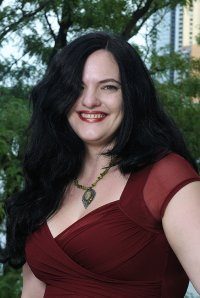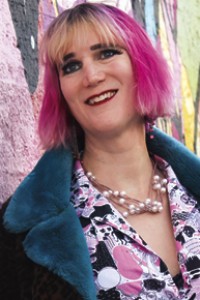Greg van Eekhout: Story Grenades
 Greg van Eekhout was born in Los Angeles and attended UCLA, graduating with a degree in English. He got his master’s in educational media and computers at Arizona State University. After jobs making educational CD-ROMs, developing online courses, and teach English and multimedia at community colleges, he is now a full-time fiction writer and occasional freelancer.
Greg van Eekhout was born in Los Angeles and attended UCLA, graduating with a degree in English. He got his master’s in educational media and computers at Arizona State University. After jobs making educational CD-ROMs, developing online courses, and teach English and multimedia at community colleges, he is now a full-time fiction writer and occasional freelancer.
He began publishing short fiction with two pieces in Horrors! 365 Scary Stories (1998). In 1999 he attended Viable Paradise and sold a story from the workshop, ‘‘Wolves Till the World Goes Down’’, to original anthology Starlight 3 (2001). Other notable works include ‘‘Will You Be an Astronaut?’’ (2002), Nebula finalist ‘‘In the Late December’’ (2003), ‘‘Native Aliens’’ (2004), ‘‘The Osteomancer’s Son’’ (2006), and ‘‘Far As You Can Go’’ (2006). Some of his stories were collected in chapbook Show and Tell and Other Stories (2006). He’s also well known for his flash fiction – what he calls ‘‘story grenades’’ – which have appeared in numerous publications.
Van Eekhout’s debut novel Norse Code, set in the world of his story ‘‘Wolves Till the World Goes Down’’, was published in 2009. His first novel for children, funny fantasy Kid vs. Squid, appeared in 2010, and postapocalyptic middle grade novel Boy at the End of the World will appear in 2011. A fantasy trilogy set in the world of his story ‘‘The Osteomancer’s Son’’ is forthcoming, starting in 2012.
He lives in the Pacific Beach neighborhood of San Diego CA with his partner, physics and astronomy professor Lisa Will.
Livejournal: Greg van Eekhout
“I enjoyed doing creative writing assignments in high school and college. When I was about 19, I’d read all the Writer’s Digest things, and I was going to the con panels where writers drill into you how hard the business is and how hard you have to work. I think I got it, so I started writing short stories (and finishing short stories) then.
“In the ’80s and ’90s, I started submitting to small press splatterpunk horror-zines – Iniquities, Midnight Zoo, Phantasm, all these places – and I had a pretty good success rate in getting stories accepted. But not a single one of them ever got published. The magazines would always die within months of accepting a story of mine.”
…
‘‘Splatterpunk writers can be mature artists, but I was not approaching it with any maturity or artistry whatsoever. It was really surface, all the gore. If I could come up with a good description of brains being splattered on a floor, that was enough for me. Also, I eventually got bored with reading that stuff, so I didn’t want to write it anymore.
“I leveled off on writing for a while, because I was happy in my day job and I was frustrated with the rejections. Then I heard of the Viable Paradise workshop. I never could manage to get six weeks off to get to Clarion, and I didn’t foresee that happening any time soon, but Viable Paradise was just one week in 1999, so I figured I could do that. I had finished a story for the first time in probably a year, ‘Wolves Till the World Goes Down’, and I wanted to get some kind of feedback. I felt I should at least try to give being a writer a shot for a week. And even if they trashed it, I’d get some useful tips.
“As it turns out, most of my instructors really liked it. (My fellow workshoppers didn’t necessarily like it, but my instructors did.) The story actually started out as a novel. I wanted to write a novel, but I didn’t have any clue how to do it, so the story was sort of the executive summary of the novel I was not actually going to write. And that story ended up being my first pro sale. Patrick & Teresa Nielsen Hayden were instructors, and Patrick bought it for Starlight 3.”
…
“My first attempt at a novel was a YA that got trunked because I didn’t know how to write even a short book. (Now I’ve managed to cannibalize some bits for a YA that’s going to come out next year.) But after Viable Paradise, starting from ‘Wolves Till the World Goes Down’, I wrote the novel I had originally intended to write. It came out in 2009 as Norse Code.
 “I wanted my heroes in Norse Code to be the other gods, the ones who don’t have that inherited coolness – including Baldr’s twin brother, the one who was unfairly accused of killing him and loses his own life as a result. There’s this colossally unfair thing at the heart of these myths, and that’s what I wanted to play with. Also, since it’s an alternate-historical set in modern California, I blew up Los Angeles and stuff like that.”
“I wanted my heroes in Norse Code to be the other gods, the ones who don’t have that inherited coolness – including Baldr’s twin brother, the one who was unfairly accused of killing him and loses his own life as a result. There’s this colossally unfair thing at the heart of these myths, and that’s what I wanted to play with. Also, since it’s an alternate-historical set in modern California, I blew up Los Angeles and stuff like that.”
…
“A piece of flash fiction, a story in a thousand words, is like a really dense, radioactive gem – I call them ‘story grenades.’ The original ‘Kid Vs. Squid’ story came about because I was in a foul mood, and I wanted to do a lot of discrete projects that I could start and finish very quickly over a short period of time, just to lift myself out of the bad mood. I asked people on my blog to send me words to act as story prompts, and for 17 days I wrote a story a day. The flash piece that eventually grew into Kid Vs. Squid was one of those, ‘Flotsam’. A bunch of those stories have been published. For stuff I wrote in a couple of hours, over my morning coffee and a scone, they’ve been really successful. For some longer stories, I’ve linked together bits of flash fiction that seemed thematically similar into an entire piece.
 “Kid vs. Squid is part funny book (which is almost a distinct genre in middle-grade), and it’s also fantasy action-adventure. It’s fun to be able to crack jokes and not feel like it’s self-indulgent. The jokes are part of what you’re promising. As a novel, I wanted it to be a capsule summer vacation. You’re going to have a great time, but you’ll also encounter horrible things (which could be nasty dudes at the arcade, or giant monsters coming out of the ocean).”
“Kid vs. Squid is part funny book (which is almost a distinct genre in middle-grade), and it’s also fantasy action-adventure. It’s fun to be able to crack jokes and not feel like it’s self-indulgent. The jokes are part of what you’re promising. As a novel, I wanted it to be a capsule summer vacation. You’re going to have a great time, but you’ll also encounter horrible things (which could be nasty dudes at the arcade, or giant monsters coming out of the ocean).”


 Excerpts from the interview:
Excerpts from the interview:



Pingback:Tweets that mention Locus Online Perspectives » Greg van Eekhout: Story Grenades -- Topsy.com
Pingback:Book news, reviews, and musings 20 Nov 2010 | Read in a Single Sitting - Book reviews and new books